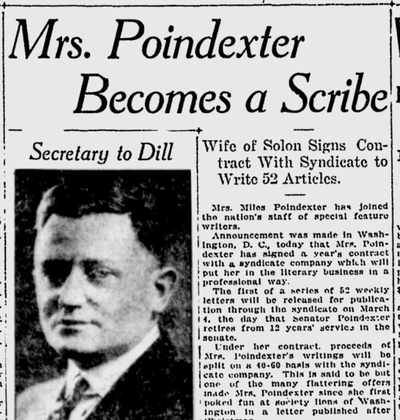100 years ago in Spokane: Wife of Sen. Poindexter made columnist for literary syndicate

Miles Poindexter, former U.S. senator from Spokane, was formally approved as the new ambassador to Peru – and his wife landed an entirely different kind of job on the same day.
Elizabeth Gale Poindexter signed a deal with a literary syndicate to write 52 weekly feature articles. The deal was a result of an article she wrote for The Spokesman-Review that “poked fun at the society lions” of Washington, D.C. She discussed upcoming legislation, foreign policy and the social scene, and she also made some pointed observations about how cabinet secretaries received some eye-popping perks at government expense.
“If I were choosing, I think I would ask to be made Secretary of the Navy, because there seems to be so much to go with it,” she wrote. “An automobile with a driver, the use of those fine small boats that go about in the waters near here, and the opportunity to take one’s family on wonderful trips.”
A senator, by the way, did not even get an automobile.
“I never could see why senators were so liberal with their (cabinet) secretaries, and so ungenerous with themselves,” she wrote.
Her article caused quite a stir when it was reprinted in a Washington, D.C., paper.
“Mrs. Poindexter is considered in Washington an exceptional type of woman, very bright and with a highly developed degree of wit,” wrote the Spokane Daily Chronicle. “She … is an unusually close observer of the things about her.”
She said she never sought a literary career, but was “catapulted into it by some innocent observations she made” in that original column. She planned to join her husband in Peru, but her columns over the next year proved to be largely about her D.C. experiences.
From the charity beat: The directors of the Florence Crittenton Home for unwed mothers voted to purchase an 18-room residence at Fifth Avenue and Adams Street as its future home.
The purchase came on the heels of a devastating fire the week before that destroyed the old Crittenton home. The organization, which had similar homes throughout the U.S., had been looking for a new and bigger building in Spokane even before the fire.